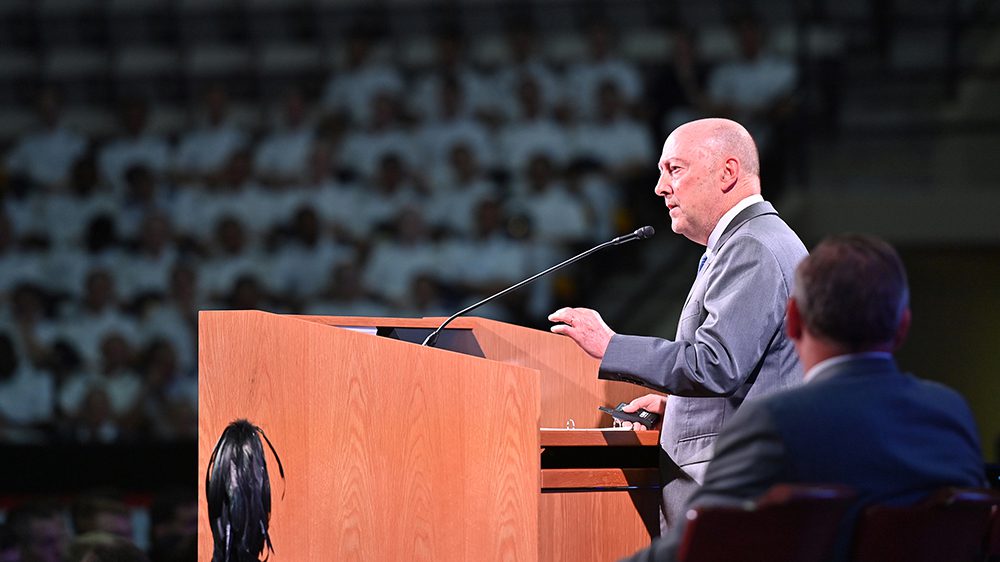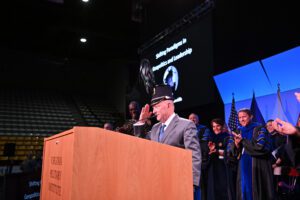Four-Star Admiral Kicks Off VMI Academic Year

Retired U.S. Navy Adm. James Stavridis addresses the Corps of Cadets during the convocation ceremony in Cameron Hall Sept. 4, 2024.—VMI Photo by H. Lockwood McLaughlin.

Retired U.S. Navy Adm. James Stavridis addresses the Corps of Cadets during the convocation ceremony in Cameron Hall Sept. 4, 2024.—VMI Photo by H. Lockwood McLaughlin.
On a morning with a trace of fall in the air, VMI kicked off its 185th academic year with a convocation ceremony in Cameron Hall Sept. 4, 2024. Retired U.S. Navy Adm. James Stavridis, the H.B. Johnson Jr. Class of 1926 Distinguished Speaker, addressed the entire Corps of Cadets, members of the academic board, faculty, and staff.
Brig. Gen. Robert Moreschi, Ph.D., dean of the faculty and deputy superintendent for academics, welcomed those assembled, especially the Rat Mass, to the rats’ first convocation, marking a moment to reflect on a fresh start and a clean slate. He thanked the alumni and other benefactors for their ongoing generous support of VMI programs and initiatives and recognized the cadets distinguished in academic merit, as well as the many contributions of the faculty over the past academic year.
Maj. Gen. Cedric T. Wins ’85, superintendent, said VMI is privileged to have excellent facilities and resources to complement the academic programs and cited the Center for Leadership and Ethics as an example. “The CLE provides opportunities to listen and engage with many leaders through conferences and leadership training. This year, their theme is ‘paradigm shifts,’ and during the year, the CLE will explore three important paradigm shifts: Disruption of the current world order; cultural change; and widespread use and impact of digital technologies, especially social media and artificial intelligence. These paradigm shifts challenge the way leaders interact with and influence their followers. Each shift necessitates leaders who are authentic, ethically grounded, intellectually astute, and spiritually and physically resilient,” said Wins. He then introduced the keynote speaker, describing him as “one of the premier thought leaders on international relations and global security in our country, and who has a great deal of real-world experience executing several of the paradigm shifts we will examine this year.”
Stavridis centered his talk on the ever-shifting world and what the cadets need to do to become effective leaders, either in the military or as civilians, as they confront a world full of violence and difficulty and the paradigm shifts that follow.
He discussed how the conflict in the Middle East is polarizing and that it is possible for two things to be true at the same time. “Israel was viciously attacked, using rape, kidnap, and mutilation as tools of war. It is also true that the conflict has created a humanitarian crisis affecting 2.2 million people caught between Israel’s absolute right to defend itself and retaliate.” It was at this point that Stavridis described a paradigm shift: That the military center of gravity is not the Gaza Strip, but the 400 miles of tunnels built beneath Gaza. “This is where Hamas and its owner and operator, Iran, managed to construct, train, equip, organize, and launch these horrific attacks. The Israelis will decommission these tunnels.”
He cited another paradigm shift, that of a new international coalition that can step in and ease the conflict and discord in Gaza. He predicted it will be some combination of the Palestinian Authority; the United Nations; Israel, which will maintain some level of engagement; and the Arab League. “Some number of Arab peacekeepers from Egypt, Saudi Arabia, the United Arab Emirates, and Jordan will be the muscle. But lurking like a Death Star is Iran, which owns and operates not only Hamas but also the Houthi terrorists operating in the Red Sea, attacking our destroyers and crushing international commerce. How will it be resolved in the Middle East? We don’t know, but building on the accomplishments of the Abraham Accords, we should watch for the Kingdom of Saudi Arabia to step up and recognize Israel over the coming months, and watch for a U.S. specific security guarantee,” Stavridis advised.

Adm. James Stavridis renders a salute to the Corps of Cadets while wearing a VMI shako in Cameron Hall. —VMI Photo by H. Lockwood McLaughlin.
The admiral then talked about Vladimir Putin and the war in Ukraine. “It’s really the war of Putin’s ego. He wants to rebuild the old USSR, and the only things stopping him are a combination of sanctions, heavily arming the Ukrainians, coupling that with their fighting spirit, and another paradigm shift of using unmanned vehicles. The Russian Black Sea Fleet at the start of this war had 60 warships. Twenty-five of them have been sunk. Yet Ukraine has no Navy. They did it with exquisite intelligence and unmanned vehicles.”
He stated that NATO has never been wealthier and stronger, which is another paradigm shift. “We’ve just added Finland and Sweden, and although they are small countries, they punch above their weight.” But he warned not to discount Putin, who is conducting massive bombing raids and recruiting around the world. “The largest Russian military recruiting station in the world is in Havana, Cuba. Putin still has what remains of the Black Sea Fleet, which gives him capability. He can also go after critical European infrastructure pipelines, and the use of cyber, another paradigm shift. Putin seeks to divide the citizens of the U.S. and to exploit the divisions. He’ll go after North Korea and China to resupply him. Russian and China are drawing closer and closer together.” Stavridis predicted that, in another paradigm shift, Ukraine will join NATO and the European Union.
Stavridis turned his attention to another paradigm shift, China and its competition with the U.S., as China builds a geoeconomic strategy in order to dominate Asia. “China believes it owns the South China Sea, which puts the U.S. in a maritime state of high tension. Put cyber alongside it, put North Korea in the mix, and you see this bubbling cauldron in the Pacific.” He mentioned Taiwan, which has only 23 million people but is the 25th largest economy in the world and is a leading manufacturer of high-end microchips. “That’s the good news about Taiwan. The bad news is their military is out of date. They must prepare for China. How does this come out between the U.S. and China? Could we stumble into a war with China? You bet, but on the other hand, we could arrive to a ‘modus vivendi,’ which is a Latin term for a way of living together, but this paradigm of a surging China will challenge us.”
He shared some tools of leadership that matter at every level and are relevant in the shifting world. “The first thing you should do is study history and creative leaders. Franklin Delano Roosevelt was a grand strategist, a master of detail, and a master communicator who could captivate and comfort the nation during his fireside chats in the midst of the Great Depression and the throes of World War II. Another great leader was your very own George Marshall [Class of 1901], who exemplified those same qualities.” Stavridis continued to describe great leaders as those who listen more than they talk, are well-read, great communicators, resilient, and innovators. He singled out the innovation of AI as being the greatest of all the paradigm shifts. “AI is coming, and in the business of war, AI is going to be huge. We must continue to innovate because our enemies are innovators, and we must stay ahead.”
Stavridis warned that all the leadership tools he mentioned are useless if they do not rest on a bedrock of values. “Our values are democracy, liberty, freedom of speech, freedom of assembly, freedom of education, gender equality, and racial equality. We execute them imperfectly, but they are the right values. That is not a paradigm shift.”
Finally, he reminded his audience to remain optimistic and quoted Napoleon Bonaparte, “‘A leader is a dealer in hope.’ Be that kind of leader.”
As a token of thanks for his inspiring message, Stavridis was presented with a VMI shako with a plume. He placed the shako upon his head and gave a salute, to which the Corps returned a spirited cheer.
Stavridis served 37 years in the Navy. Among his many commands were 4 years as the 16th Supreme Allied Commander at NATO and the U.S. Southern Command in Miami. He was the longest-serving combatant commander in recent U.S. history. He served as senior military assistant to the Secretary of the Navy and the Secretary of Defense and led the Navy’s premier operational think tank for innovation, Deep Blue, immediately after the 9/11 attacks. Following his military career, he served for 5 years as the 12th dean of the Fletcher School of Law and Diplomacy at Tufts University. Stavridis has published 13 books. Two of his most popular are “To Risk It All: Nine Conflicts and the Crucible of Decision” and “2034: A Novel of the Next World War,” a New York Times bestseller co-authored with Elliot Ackerman. His most recent novel, “2054,” takes place in the future and deals with AI and geopolitics.
Editor's Note: Story originally published by Virginia Military Institute.